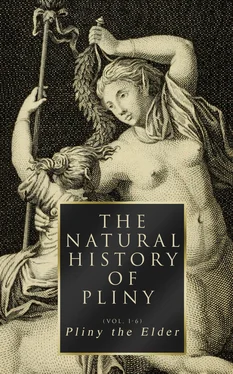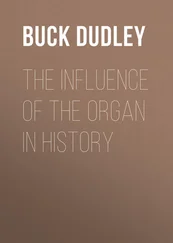Of all the works written by Pliny, one only, the ‘Historia Naturalis’ has survived to our times. This work, however, is not a ‘Natural History’ in the modern acceptation of the term, but rather a vast Encyclopædia of ancient knowledge and belief upon almost every known subject—“not less varied than Nature herself,” as his nephew says. It comprises, within the compass of thirty-seven books, 20,000 matters of importance, collected from about 2000 volumes (nearly all of which have now perished), the works, as Pliny himself states, of 100 writers of authority; together with a vast number of additional matters unknown to those authorities, and many of them the results of his own experience and observation. Hardouin has drawn up a catalogue of the authors quoted by Pliny; they amount in number to between 400 and 500.
The following is a brief sketch of the plan of this wonderful monument of human industry. After a dedicatory Epistle to Titus, followed by a table of contents of the other Books, which together form the First Book, the author proceeds to give an account of the prevailing notions as to the universe, the earth, the sun, the moon, the stars, and the more remarkable properties of the elements ( partes naturæ ). He then passes on to a geographical description of the face of the earth as known to the ancients. After the Geography comes what may in strict propriety be termed “Natural History,” including a history of man, replete indeed with marvels, but interesting in the highest degree. Having mentioned at considerable length the land, animals, fishes, birds, and insects, he passes on to Botany, which in its various aspects occupies the larger portion of the work. At the same time, in accordance with his comprehensive plan, this part includes a vast amount of information on numerous subjects, the culture of the cereals and the manufacture of oil, wine, paper ( papyrus ), and numerous other articles of daily use. After treating at considerable length of Medical Botany, he proceeds to speak of medicaments derived from the human body, from which he branches off into discussions on the history of medicine, and magic, which last he looks upon as an offshoot from the medical art; and he takes this opportunity of touching upon many of the then current superstitions and notions on astrology. He concludes this portion of his work with an account of the medicinal properties of various waters, and of those of fishes and other aquatic animals. He then presents us with a treatise on Mineralogy, in which he has accumulated every possible kind of information relative to the use of gold, silver, bronze, and other metals; a subject which not unnaturally leads him into repeated digressions relative to money, jewels, plate, statues, and statuaries. Mineral pigments next occupy his attention, with many interesting notices of the great painters of Greece; from which he passes on to the various kinds of stone and materials employed in building, and the use of marble for the purposes of sculpture, including a notice of that art and of the most eminent sculptors. The last Book is devoted to an account of gems and precious stones, and concludes with an eulogium on his native country, as alike distinguished for its fertility, its picturesque beauties, and the natural endowments and high destinies of its people.
From the writings of Pliny we gather of course a large amount of information as to his opinions and the constitution of his mind. His credulity, it must be admitted, is great in the extreme; though, singularly enough, he severely taxes the Greeks with the same failing 18. Were we not assured from other sources that he was eminently successful in life, was in the enjoyment of opulence, and honoured with the favour and confidence of princes 19, the remarks which he frequently makes on human life, in the Seventh Book more especially, would have led us to the conclusion that he was a disappointed man, embittered against his fellow-creatures, and dissatisfied with the terms on which the tenure of life is granted to us. He opens that Book with a preface replete with querulous dissatisfaction and repinings at the lot of man—the only ‘tearful’ animal—he says 20. He repines at the helpless and wretched condition of the infant at the moment it is ushered into life, and the numerous pains and vices to which it is doomed to be subject.—Man’s liability to disease is with him a blemish in the economy of nature:—“life,” he says, “this gift of nature, however long it may be, is but too uncertain and too frail; to those even to whom it is most largely granted, it is dealt out with a sparing and niggardly hand, if we only think of eternity 21.” As we cannot have life on our own terms, he does not think it worthy of our acceptance, and more than once expresses his opinion that the sooner we are rid of it the better. Sudden death he looks upon as a remarkable phænomenon, but, at the same time, as the greatest blessing that can be granted to us 22: and when he mentions cases of resuscitation, it is only to indulge in the querulous complaint, that, “exposed as he is by his birth to the caprices of fortune, man can be certain of nothing; no, not even his own death 23.” Though anything but 24an Epicurean, in the modern acceptation of the word, he seems to have held some, at least, of the tenets of Epicurus, in reference to the immortality of the soul. Whether he supposed that the soul, at the moment of death, is resolved into its previous atoms or constituent elements, he does not inform us; but he states it as his belief, that after death the soul has no more existence than it had before birth; that all notions of immortality are a mere delusion 25; and that the very idea of a future existence is ridiculous, and spoils that greatest 26blessing of nature—death. He certainly speaks of ghosts or apparitions, seen after death; but these he probably looked upon as exceptional cases, if indeed he believed 27in the stories which he quotes, of which we have no proofs, or rather, indeed, presumptive proofs to the contrary; for some of them he calls “magna 28fabulosetas,” “most fabulous tales.”
In relation to human inventions, it is worthy of remark, that he states that the first 29thing in which mankind agreed, was the use of the Ionian alphabet; the second, the practice of shaving 30the beard, and the employment of barbers; and the third, the division of time into hours.
We cannot more appropriately conclude this review of the Life and Works of Pliny, than by quoting the opinions of two of the most eminent philosophers of modern times, Buffon and Cuvier; though the former, it must be admitted, has spoken of him in somewhat too high terms of commendation, and in instituting a comparison between Pliny’s work and those of Aristotle, has placed in juxtaposition the names of two men who, beyond an ardent thirst for knowledge, had no characteristics in common.
“Pliny,” says Buffon 31, “has worked upon a plan which is much more extensive than that of Aristotle, and not improbably too extensive. He has made it his object to embrace every subject; indeed he would appear to have taken the measure of Nature, and to have found her too contracted for his expansive genius. His ‘Natural History,’ independently of that of animals, plants, and minerals, includes an account of the heavens and the earth, of medicine, commerce, navigation, the liberal and mechanical arts, the origin of usages and customs, in a word, the history of all the natural sciences and all the arts of human invention. What, too, is still more astonishing, in each of these departments Pliny shows himself equally great. The grandeur of his ideas and the dignity of his style confer an additional lustre on the profoundness of his erudition; not only did he know all that was known in his time, but he was also gifted with that comprehensiveness of view which in some measure multiplies knowledge. He had all that delicacy of perception upon which depend so materially both elegance and taste, and he communicates to his readers that freedom of thought and that boldness of sentiment, which constitute the true germ of philosophy. His work, as varied as Nature herself, always paints her in her most attractive colours. It is, so to say, a compilation from all that had been written before his time: a record of all that was excellent or useful; but this record has in it features so grand, this compilation contains matter grouped in a manner so novel, that it is preferable to most of the original works that treat upon similar subjects.”
Читать дальше












